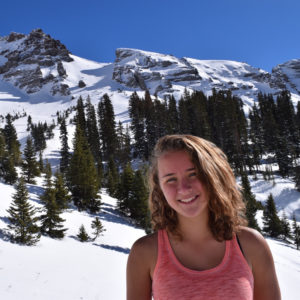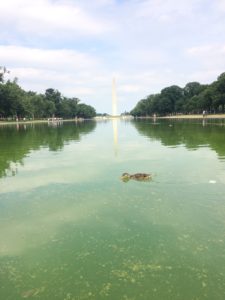
Esme Fahnestock
Hi, my name is Esme Fahnestock and I go to Telluride High School.
It almost feels like a swarm of bees has moved into my head, with all of the buzzing going on. It’s an
overload of information and I’ve only spent 3 days days at my internship. On Tuesday, June 14, I arrived by plane in Washington, D.C. with a duffel bag full of nice clothes (mostly borrowed), a backpack with a few books and my computer, and a lump of excitement in my throat. I was picked up by my cousin and circumvented the city via the beltway to arrive in Chevy Chase, MD, a town bordering D.C. My host family was getting in bed when I came knocking on the door, but quickly welcomed me into their beautiful home. The next morning, I was to make my way to the George Washington University and meet Dr. El-Bayoumi, the founding director of the Rodham Institute, at the clinic located there. The Rodham Institute is an organization that works throughout D.C., a city that suffers from a large divide between the health of the upper and lower class, to educate and bring healthcare to those who otherwise lack the resources.
It’s hard to put words to just how much I have learned since I arrived in D.C. I’ve had to figure out the metro system and navigating a city (I’ve gotten lost several times). I’ve had to learn to take care of myself. But, it’s so much more than that. It is crazy to see the world from outside of our little valley in Colorado. Thursday afternoon, I had the opportunity to join the incoming medical interns at George Washington University on a bus tour and lecture at the United Hospital on the east side of D.C. It was across the Anacostia River, through the “See The City You Serve” event put on by the Rodham Insitute. This area, particularly wards seven and eight, house some of the worst health standards in the city, if not the country. This area has ranked high, if not number one in the nation, in HIV, infant mortality rates, obesity, diabetes, and more. Rodham Institute sponsors and organizes this event to show the incoming doctors the conditions that many of their patients live in in hopes that it will give them background on their patients and help them to treat them.
Seeing the city from this angle, the view from across the river, really opened my eyes. Coming from Telluride, I can’t say that I was prepared. As I have been staying with a host family in the upper region of D.C., the only perspective I have on the city is the beautiful, big houses, clean streets, and bustling sidewalks. That’s not the entire picture though. In one of the parks that we drove past, a majority of National Geographic Drugs Inc. TV show, titled “PCP in DC,” was filmed. It’s such a wildly different world than what I’m used to– in a way it feels like I got on a rocket ship to a different planet when I boarded the plane to D.C.. On Friday, I was talking with Tracy, the “glue” to the Rodham Institute, and Lamek, a fellow intern with them, while they discussed privilege and gentrification of the city. Sitting in the room, as the only white person, and having grown up in a small, secluded, mostly white and upper-class town, it really flipped my world around.
There are two things that have stood out to me over the past few days. First, it has inspired me beyond words, the commitment, passion, and selflessness of all the doctors and everyone I have met at the Rodham Institute. On my first day, I was talking with Dr. Gloria about all the hardships and pains of med school, and I asked her, “So, why did you do it?” She told me about when her grandma was sick with cancer. The surgeon who was operating on her treated her unkindly and with disrespect, even forgetting to have her sign the right paperwork. She said; “I remember thinking, I can do better than that.” Dr. El-Bayoumi said, in the “See The City You Serve” lecture, that a person is so much more than statistics, numbers, tests, and treatments; “Every individual knows light and compassion and love” and that is vital to their healing, just as important as any physical aspect.

The Washington Memorial and reflecting pod. It was so hot that my phone shut down from overheating.
The second thing that I have observed is the importance of listening.
You can learn unquantifiably just by listening. Everyone has a story to tell, every patient you see in the clinic to every person you pass on the street. Dr. El-Bayoumi told me that she makes sure to get to know every one of her patients because,
as a doctor, you have the opportunity to meet some amazing people. It’s crazy that I have only been in D.C. for a few days, because, in this short time, my perspective has been completely shifted.

There are no comments published yet.